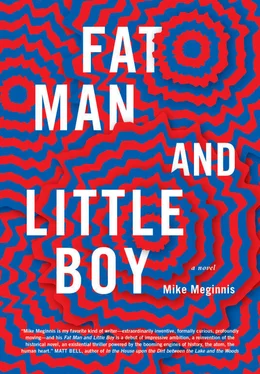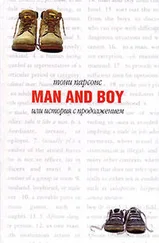Here and now he is happy.
If in his happiness he should hum some tuneless tune, then what harm amidst insensible French? Which itself is not wholly unlike the sounds of scales played on a flute—the flutter of the air’s escape, the soft, soft fingers fingering. He bobs his head. He sweeps the floor. His arms are numb.
He wants to piss himself he’s so happy.
When the owner gives him bread he holds it through his yellowed cuffs so the mold will grow more slowly. He drinks the milk like shooting hard liquor, swallowing faster than it can spoil, tasting nothing but a hint of fat.
When the night is thick and the tables are full Albert comes, without Francine. Little Boy goes to him, nods while Albert speaks to him, and if Albert is cruel then Little Boy doesn’t know or understand. Albert smokes and reads a novel. He kicks up his feet on the table. For a while he seems to talk to Little Boy about what he is reading, or not what he is reading, and then they are done talking.
Little Boy sweeps the floor. He sneaks a bite of cheese from an abandoned plate. He takes a crumpled bill forgotten at an empty table. He knows, as he knows whenever he steals, Fat Man will be pleased with him. Perhaps if they exchange more money they can exchange fewer words.
That night Fat Man counts out the cash and the pawnable items, passing them from one soft black palm to the other and then piling them in a cloth sack.
“What a good little thief you’ve become.”
Little Boy shrugs. His cheeks throb like an oven’s coil.
“It’s circumstances. Are we supposed to go on wearing these clothes? People can barely look at us.”
“They can look at me just fine,” says Little Boy. “They think I’m cute.”
“When Francine asks us where we got the money you can say it’s from begging.”
They lie together in the quiet. It’s not quiet enough. Francine and her husband are arguing upstairs. Little Boy doesn’t ask his brother if he understands. He curls up more tightly in his blanket. His tongue feels fat from speaking and he’d like to stop now.
As if to cover for something embarrassing, Fat Man pipes up again. “Have you learned any new words yet?”
Little Boy doesn’t answer.
“Matthew,” says Fat Man, “have you learned any new words?”
“No.”
“How do we say that in our French?”
Little Boy shakes his head.
“It’s non . Just no with another n. That one’s easy.”
Francine shouts something at her husband. Something about babies, thinks Little Boy. He doesn’t want to know that word. He covers his head with a pillow.
“What about cheese?” says Fat Man. “How do we say cheese here?”
Little Boy says, “No.”
“ Fromage . It’s fromage. We’ve been over this a thousand times. You’ll never learn if you don’t even try.”
Little Boy pretends to snore.
“Some women would count themselves blessed to live childless,” growls Albert. The ceiling seems to sing along. “Some women would call it a curse to feed their mouths, to suckle them while they grow their sharp little teeth.”
“Zzzz,” says Little Boy, like an engine.
Francine makes them breakfast. When she leans over the table to serve up sausages Little Boy watches her stomach for any telltale bulges. He sees Fat Man is doing the same. They’ve also learned to watch the breasts for any growth, and legs and feet for swelling. They know about morning sickness and the things women eat.
Francine isn’t showing. But she will. Fat Man says later what Little Boy is thinking now: she’s going to be a big one, ripe and swollen like the best, most juicy pear. As for Albert, he suspects nothing. He sits with his bare feet on the table, reading the paper until breakfast is served. His nails have not been trimmed in weeks. If he still wears his gun, now he at least secrets it away somewhere. There is a bulge in his gray suit jacket this morning, which makes the cloth hang heavy from his thin, handsome body. He talks to Francine about something Little Boy wills himself not to understand. She is hunched over the stove. The words roll off her shoulders and down the long, hard curve of her back. She waves him away with a limp motion of her wrist.
“There’s an Oriental spirit medium coming through town in two weeks,” says Francine. “I hear she’s quite lovely. Maybe we should see her when she comes.”
There’s a little blonde girl at the restaurant that day, there with her mother on holiday. Maybe her birthday. The girl eats cake and other sweet things. Her mother seems to be there to watch her eat. Little Boy sweeps a spiral around their table until he is sweeping beside them. Today the language is like a hundred balloons floating overhead and bobbing up against the ceiling. Little Boy smiles at the little girl. He’s pulled his suit jacket closed and buttoned it to hide the yellow filth of his shirt. It doesn’t fool her. She won’t show her teeth. It occurs to him his teeth are all the wrong color.
There’s a pile of dust and pocket lint and bits of crust and crumbs pushed together where he left them by the wall. He nudges newly collected debris—picking up a brass key that fell from someone’s pocket, tucking it in his—and adds it all together. He sweeps up all of it in his dustpan and empties it out in the kitchen dustbin. He looks at the blonde girl with her mother in the dining room. She’s babbling at her mother. Today all the language is like vomit sloshing ankle-deep on the floor.
Now Albert comes into the restaurant, a friend by his side. They sit at his usual table and light cigarettes. They tap out their ashes at the same time—it looks as if the orange lit ends are kissing in the blue ceramic tray. The friend is tall and wears a gray flannel suit with a blue tie. His cheeks are lousy with burst veins. His eyes bulge unpleasantly. He sees Little Boy staring and calls him over. He touches Little Boy on his shoulder, on his tummy, through the boy’s threadbare suit. He musses his hair and tweaks his nose. There is laughter in his eyes, his mouth is partly open, Little Boy can see his bumpy tongue between his skewed white teeth, peeking out like an inmate. Albert is droning softly in his friend’s ear, and Albert’s friend nods slowly, accepting each word. His mouth is tight at the corners. His Adam’s apple rises and falls like a hand-cranked elevator. He won’t stop touching Little Boy’s hair. Little Boy walks away, and if they object, if they don’t like the way he leaves them to their own, then he cannot hear them say it, or does not know he hears.
Two French policemen, one short and one thin, come into the café. Little Boy pretends not to recognize them. They seem, for one glorious moment, not to recognize him either. They do not meet his eyes or say a word to him, do not acknowledge his familiar face. Maybe they have forgotten, or maybe these are other police who only look very similar; he is too afraid to study them openly, to confirm they are or are not who he thinks.
They go to Albert’s table. They tell Albert something to the effect of he is under arrest. Or maybe they are only asking him to go with them: they do not cuff his hands. He seems to have known they would come for him. He may have told his friend, who does not seem to be distressed. As they are leaving, the short one—Mr. Bruce—turns to Little Boy and winks.
Little Boy goes to see Fat Man. He doesn’t tell about the police because he doesn’t want to make his brother mad. Fat Man will find out soon enough. They share a lunch of bread and cheese. The cheese grows a slow, strangely colored mold as they eat it. When they want another bite they scrape away this second skin.
Fat Man says, “It feels good to be working again.” The sink is full with filth, and maggots squirm therein. “Would you like to see the Oriental spirit medium when she comes?”
Читать дальше












